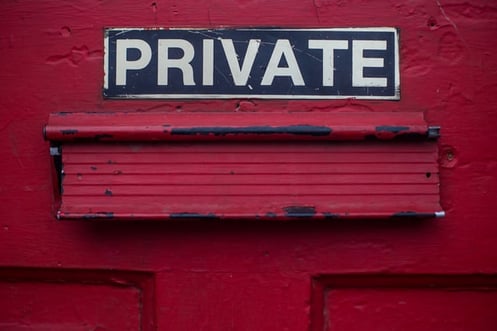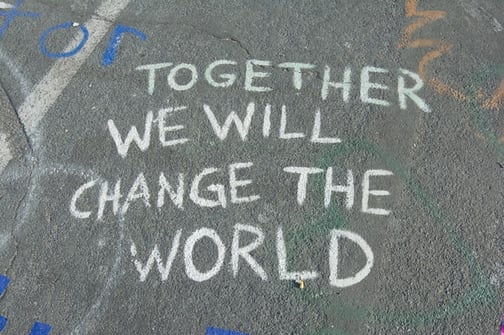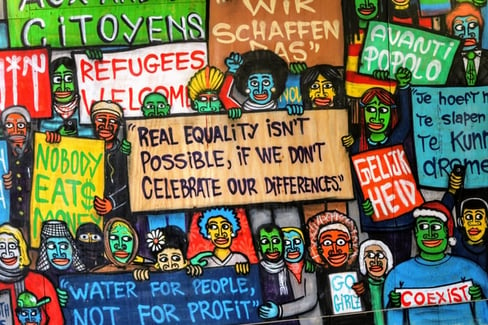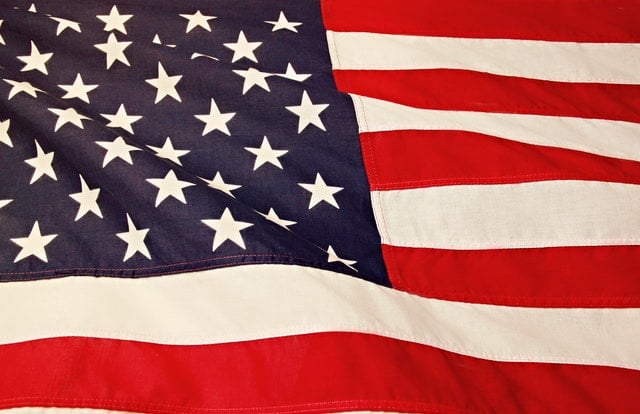In 1984, one man tried to tell the world what makes Americans tick. It was his job to prepare foreign visitors for culture shock in the USA. His name was L. Robert Kohls and he was the Executive Director of the Washington International Center in Washington D.C.

In his classic article “The Values Americans Live By”, Kohls claims that:
- His list of values (below) explains 95% of all “American actions”.
- Americans see each value as positive.
- Many foreigners see the same values as negative.
As an American living in Spain, I’ve used this list of values to understand myself better: Why do my values clash with Spanish values sometimes? What can I learn from this list?
As an American family hosting an exchange student, you can use this list of values to understand your experience better. America is a culturally diverse country:
- Do you share the “American values” below?
- Or do you prefer the traditional values that contrast with each one?
Let’s take Kohls’ values one by one to see how they play out during a typical student exchange. Most American host families share many of the values below. Many exchange students bring opposite values to share. The result can be frustrating if we don’t see what’s happening. However, if we know what’s going on, every moment together will be fun… and fascinating!
Individualism vs Group Welfare
What’s the best way to organize society?
A. Should each person take care of themself first, so they have more to offer to others?
B. Should each person put the needs/desires of their group (i.e. family, friends, company) first, so the group will take care of them?
In Western countries, we have been investing in option A since the Renaissance, with individualism “taking its most exaggerated form in 20th century United States”, according to Kohls.

This is one of the attractions of the USA: your life is yours, you can choose how to live it; you decide how you want to spend your time. You can pursue your passions and make your dreams come true.
Often this means spending less time than we wish with family - especially extended family - and friends, or even moving far away from them. But here’s the real beauty of American individualism: we are all in this together. We know our loved ones understand, and we support each other.
In traditional cultures around the world - many Asian, African, Latin American and Mediterranean cultures - people prefer to put their group first. And this means spending time together, lots and lots of time.
Living in Spain, I've always been surprised at how much time people spend with family. It’s common to spend all day Saturday with one side of the family and all day Sunday with the other - every weekend. Many multigenerational families also take vacations together. And even though unemployment is high, it's common to refuse a job that requires moving away from family.
A Mexican friend in college told me he felt bad when he saw Americans walking or eating alone. "This is a lonely country," he said. "Why aren't people with their families?" I had to explain that it's normal to do things by yourself in the USA. We spend time with our families, but we also like doing our own thing. And we enjoy this balance.
How do the foreigners in your life see American individualism? Do they like spending time alone? Is it normal in their country to "do your own thing" even if that's not what your family wants? Why or why not?
This is an excellent topic to explore with exchange students...
Uniqueness
It’s good to be unique, isn’t it?

When I was growing up in the USA, I was encouraged to “be myself”, to figure out what I was good at and then develop my own unique talents. I even got to choose many of my classes in high school and college - another chance to differentiate myself. And of course, I chose my clothes and hairstyles. I often felt different from other people, and that was okay.
Raising my kids in Spain, a more group-oriented culture, I was struck by the education system. It’s so homogenous. If you meet an engineer, you know exactly which classes she took from kindergarten through university. Same goes for a psychologist, a lawyer, a plumber or a hairdresser. No electives. No experimentation. No choices.
In many countries schools require uniforms, do not allow girls to wear makeup and require boys to keep their hair cut short. "Can I dye my hair pink?" asked my lovely student from Thailand. She explained that her year abroad was her big chance to deviate from the norm.
What about you? Do you want to be just like the people around you? Or do you enjoy developing your own uniqueness and "being yourself"? What about your friends from other countries? What was their experience growing up?
Privacy
How would you like to live without privacy?
“The word “privacy ”does not even exist in many languages. If it does, it is likely to have a strongly negative connotation, suggesting loneliness or isolation from the group.” (Kohls)

Privacy is a sacred value in the USA, but the kind of privacy we enjoy baffles people in many countries. How can small children put “keep out” signs on their bedroom doors? Why would family members knock before entering each other’s rooms? Why do even criminals have some privacy rights?
As a student in Spain, and then as a young wife and mother, I was continually shocked when extended family members would come into my bedroom to ask questions or look for something - without knocking first! And Spain is much more similar to the US in terms of personal privacy than India, for example.
Around the world, in so many places, privacy is not an issue because it doesn't exist. Could you live like that? What's it like in your exchange student's country? Can children keep family members out of their rooms? Is it necessary to ask permission before using other people's things?
Yet another fascinating conversation starter...
Change
Isn’t it nice to change things up now and then?
Of course change can be bad, but who doesn’t love to make positive changes: at work, at home, in themselves, in the world? Think “out with the old, in with the new”, “live your best life” and “make the world a better place”.

“In the American mind, change is seen as an indisputably good condition. Change is strongly linked to development, improvement, progress, and growth,” writes Kohls in 1984. He also noted that many cultures around the world do not like change and see it as a negative thing, even “a disruptive, destructive force, to be avoided if at all possible”.
But, isn’t the whole world changing fast? What about internet, laptops, mobile phones, big data and artificial intelligence? Aren’t countries around the world transforming their countries with new technology?
“There is no doubt that dazzling technological changes are taking place,” says anthropologist Geert Hofstede, “but people (around the world) put these new technologies to familiar uses... to do much the same things their grandparents did.”
Possibility
“Americans seem challenged - even compelled - to do what… 7/8 of the world is certain cannot be done,” writes Kohl. And, is there any doubt that the land of opportunity is still just that?
Welcome Elon Musk and so many other great brains that the US has drained from countries around the world. Many foreigners are baffled by the “Can-Do People”, as author Craig Storti calls Americans. But those same people might also be attracted from abroad to this great culture of possibility, where anything is possible.

Kohls points out that Americans have literally gone to the moon thanks to this value. Achievements like this break mental barriers around the world. And then we search for new challenges, new puzzles to solve: new vaccines, cures for cancers, space travel, artificial intelligence… No problem is too great to solve?
What about the foreigners in your life, friends and exchange students. Do they believe anything is possible? Do they believe fate or luck play a role in what's possible or not? Why?
Time
Back in 1984 Kohls noted that “Time is, for the average American, of utmost importance.”
Has anything changed since then? Yes!
Time in the USA is more valuable than ever. Today most Americans have their own computer, a phone and connection to the Internet: it’s possible to do many more things at once, even faster and better than before.

This is still a major cause of culture shock for foreigners in the United States. I’ve heard entrepreneurs in the south of Spain warn one another to be on time to meetings with Americans. “I was five minutes late,” recalled one man at an international export summit, “and they refused to meet with me!”
Exchange students often suffer culture shock in this area. "I was five minutes late, and my host mom left so I had to find a ride home," one reported, while another recalled that "my host parents made their son and I take a taxi to school because we weren't ready on time."
Late is not taken lightly in the USA...
But how late is late? It depends on the country. Professor Erin Meyer teaches the difference between rigid time in countries like the US and northern Europe, and flexible time in many traditional cultures around the world.
- In Saudi Arabia, appointments can be quite flexible, as actor Tom Hanks realized in A Hologram for the King.
- In Nigerian a friend of mine loves her flexible "African time".
- In Morocco time seems to me to literally stand still.
What could Americans learn from other cultures? Relax. Slow down a bit. Enjoy life more. Take breaks. Drink coffee together. Sit together with other people more and build relationships. Life is short, and in the end, we’re all going to the same place.
Ask the foreigners in your life: what is time like in your country? How late is late? How do people react when someone arrives late?
Productivity
As Kohls points out, Americans value time in order to be productive - something just as true today as it was then.
- How much can we accomplish?
- How many clients can we serve?
- How many reports can we produce?
- How many items can we churn out of our machines?
Productivity is a great example of how true our cultural values seem to us. They are like the water that a fish swims in: invisible. Getting things done and doing more is just part of life in the USA. Just check out these lists of apps that promise to save you time as you accomplish more:

When I teach cultural competence to professionals, I love to ask: “Is productivity really a good thing? Do we really need more, better - faster?"
Making productivity a priority has made America great. Yes! But, it’s good to question our values now and then to see if maybe we’ve outgrown them, or need to make some adjustments.
What can our foreign friends from less productive countries teach us? Life can be lived in other ways. It is possible to produce less, have less, do less... and still be happy. Maybe even happier sometimes?
What do your foreign friends think?
Equality
“Equality is, for Americans, one of their most cherished values,” says Kohls.
“But people are not equal in the US,” my foreign friends and students protest. “There’s discrimination, racism, poverty - lots of inequality.”

What they don’t understand is that Americans cherish the idea that each person has equal value. From there, the goal is equal opportunity: how can we ensure that everyone who works hard has an equal chance of making their American dream come true?
People around the world might admire this American value (once they understand it). However, right now, around the planet, billions of people are living happy lives in hierarchical societies that value rank, status and authority more than equality - and that includes billions of people of low rank, low status and little authority.
Does that spark your curiosity? Do you wonder how it’s possible? Another great conversation to have with friends from around the world. What is life like in a hierarchical society? School? Work? Family? What are the pros and cons?
Self Help
“Americans pride themselves in having been born poor and, through their own sacrifice and hard work, having climbed the difficult ladder of success to whatever level they have achieved,” notes Kohls, three decades ago.

When my husband lived in Seattle, he wanted to learn Mandarin, so I introduced him to one of my immigrant students. Bai, a recent immigrant from China, was the maintenance man at a small hotel. But when we checked in just a few years later, he had his own successful business and a nice home in a middle class neighbourhood. Bravo!
The American dream is famous around the world - but it’s baffling too. How do people climb the social ladder in the USA? Does it all come down to hard work? Do you have to get lucky?
Social mobility might be getting harder in the US, but it’s still easier - and more possible - than in many other regions around the world. Even in Europe, we are not seeing Asian, African or even many Latin American immigrants move as quickly up the food chain like so many newcomers do in the US.
What about the countries you have ties to, through family, friends and students? Is it easy to move up in society? Can new immigrants from around the world get a good education, good jobs, vote and even participate in politics?
Competition and Free Enterprise
Back in 1984 Kohls stated that “Americans feel very strongly that a highly competitive economy will bring out the best in its people and ultimately, that the society which fosters competition will progress most rapidly.”
But how do Americans feel about this today?

Competition and free enterprise are under fire today. Not everyone in the USA agrees that they bring out the best in people in every area of society. Nevertheless, the economy continues to operate on these principles...
Meanwhile, around the world many traditional cultures value cooperation over competition. Even in Europe, social welfare systems are all about cooperating together to take care of everyone - especially when it comes to universal, free healthcare.
This is just one more key value to explore with foreign friends.
- What’s it like in their country?
- How competitive are their schools?
- How competitive are is their economy?
- Do co-workers prefer to cooperate or compete?
- Do companies give individual or team/group incentives?
- What about healthcare: is it private or public?
Before I left the USA, I could only see the value of competition for bringing out the best in people. After 25 years abroad, I appreciate the value of cooperation as a way to bring out a different kind of best in people.
Future
“Valuing the future and the improvements Americans are sure the future will bring means that they devalue the past and are, to a large extent, unconscious of the present,” claims Kohls.
Do you agree with this statement today?

The United States of America is a young country. It was built by colonists and pioneers who had to set goals, draw up plans and work hard to build a future. Little did they realize they were also building a future-oriented culture.
Even today Americans are thinking ahead, setting goals, and making plans. But many people also have a new future goal: enjoy the present. And that’s created a movement: mindfulness, meditation and even best-sellers like The Power of Now.
What are the pros and cons of a future focus? How can we enjoy the present more? How can we appreciate our past more? What can our friends from around the world teach us about living in the present, past and future?
Action/Work
“The first question one American will ask another when meeting for the first time is related to his or her work: ‘what do you do?’" (Kohls)
Americans like to be busy, but work itself is a tricky value. Ask someone from Japan if Americans value working hard, and they may smile politely. Japanese are famous for working long hours, even working themselves to death (karoshi). The rest of the world can hardly compete.
Photo: Americans at Work is a guide for foreigners, but also useful for Americans wishing to see themselves from the outside looking in.
The real question is: do Americans work to live or live to work?
In most European countries, people aim to work to live. They want quality of life. That means putting their job in a neat little box, so they can enjoy the rest of their life. In countries like Germany, France and Spain, for example, everyone has four weeks paid vacation from the day they sign their contract.
But from a global perspective the situation in the USA isn’t that bad according to Forbes Magazine, “While Americans’ less frequent vacations mean they work more hours annually than many Europeans, we still significantly trail workers in countries such as Mexico, South Korea, Iceland, Portugal, Israel, and even, surprisingly, Greece.”
What do you think: do Americans live to work or vice versa?
What does this topic look like from your foreign friends' perspectives?
Informality
“One can go to a symphony performance… in any large city nowadays and find some people in the audience dressed in blue jeans and tieless, short-sleeved shirts.” That was in 1984. What about now?
“Mom!” it was my oldest daughter on FaceTime; she was whispering: “I’m in the library.” After growing up in Spain, she had just arrived in the US to start college. “There’s a girl here, wearing a onesie, doing yoga on the floor. Is that normal?”
Why not?

It’s okay to dress casual in the USA in so many situations that would not be appropriate in other countries. And the same goes for using first names and talking to perfect strangers (as if we knew them).
You would think that people around the world would enjoy letting their hair down in the US, but that’s not always the case. Formality is highly valued in many countries around the world: dressing for dignity and addressing others with proper titles to show respect.
Do you value American informality?
Would you prefer living in a more formal culture?
Why or why not?
Directness
Americans value directness or "getting to the point". Straight talk works for us because it’s efficient, saving time, money and energy. Unfortunately, this approach creates a lot of problems with most of the rest of the world...
And I say most, because that doesn't include Dutch, Germans, Israelis and Russians. They tend to value even more directness. And they can perceive Americans as beating around the bush and sugarcoating negative feedback (which they may find patronizing).
What happens if you host an exchange student from Germany or Holland? Their very forward communication style might seem impolite at first, even though they have the best intentions. But once you understand their culture, it can be refreshing.
What happens if you host a student from Japan, Thailand or Mexico? Their careful, polite communication style can seem dishonest or manipulative - even though they're just trying to be kind and nice. But once you understand their culture, it can be heartwarming.

Photo: Americans tend to value “putting their cards on the table” and talking things over.
Have you seen the movie My Big Fat Greek Wedding? Here is my favorite example of indirect, careful communication that saves face. It’s a funny exaggeration, but you’ll get the point.
Kohls is very careful to warn foreigners against using these kinds of tactics in the USA. “Americans consider anything but the most direct and open approach to be dishonest and insincere and will quickly lose confidence in and distrust anyone who hints at what is intended rather than saying it outright. Anyone who, in the United States, chooses to use an intermediary to deliver the message will also be considered manipulative and untrustworthy,”
This is an important topic to broach with foreign friends and colleagues.
- What do they like about the way Americans communicate?
- What surprises or shocks them?
- How is it different in their country?
- What can we learn from each other?
Our global world is smaller every day. Intercultural communication is more than speaking a common language; we need to learn about the values that shape our communication. Then we can understand each other better, and like each other more.
Honesty
Did our first president, George Washington, really chop down that cherry tree - and then confess the truth to his father? It doesn’t matter. This cherished legend talks about the value of honesty in the USA.

Of course Americans do not always tell the truth, the whole truth and nothing but the truth. Of course we tell white lies. And whether we like it or not, there are situations where the truth may not be appropriate: "Do I look fat in this dress?" "What do you think of my new car?" "How's the meal I just fixed for you?"
Anyway, most foreigners - regardless of origin - are probably not convinced that people in the USA tell the truth any more than people in other countries. But they are perplexed by our obsession with honesty:
- Do we really expect politicians not to lie?
- Do we truly expect no lying under oath?
- Do we really insist kids tell the truth "no matter what"?
- Seriously?

Exploring this cultural value can help us appreciate it, but it should also make us curious about other cultures.
- Where does honesty rank in their hierarchy of values?
- What’s their definition of a lie?
- What’s the consequence for lying in different situations?
The more we know, the more sense we make of international news and the more savvy we will be abroad, and interacting with people from around the world.
Stuff
“Foreigners generally consider themselves more materialistic than Americans are likely to consider themselves,” stated Kohls, pointing out (in 1984) that the “modern American typically owns:
- One or more color television sets
- An electric hair dryer
- An electric calculator
- A tape recorder and a record player
- A clothes-washer and dryer
- A vacuum cleaner
- A powered lawn mower (for cutting grass)
- A refrigerator, a stove and a dishwasher,
- One or more automobiles
- And a telephone. Many also own a personal computer.”
Do we value stuff more or less today? You be the judge!

The standard of living has risen around the world over the last 36 years. And Americans are changing their attitudes to "stuff". There is a trend towards downsizing, people are trying to reduce waste and recycle. And Netflix is even helping us tidy up with Marie Kondo.
But Americans are still the Sultans of Stuff. We’ve still got more things than most people in the world would ever dream of having - or even wanting. As in: “where would we put it?”.
Thankfully, in the USA, when our homes begin to overflow, we have storage units!

New Stuff
“Since Americans value newness and innovation, they sell or throw away their possessions frequently and replace them with newer ones,” states Kohls.

Only the wealthiest country in the world can afford a value like this, supported by a cycle of shopping, weeding out, liquidating stuff online or at garage sales - and then heading back to the mall for refills.
Thankfully, today many Americans are putting a stop on stuff. And here’s another great topic to share with foreign friends: we can swap ideas for saving the planet through careful consumerism.

Which Values Do You Live By?
The United States is full of all kinds of people. It’s a culturally diverse society. However, Americans across the USA do share many basic values like the ones above. These are like a sticky glue that holds our society together.
Sometimes Americans clash over different values - or, different ideas about what’s most important in a given situation. That makes it even more important to look at the values we share.
If you’re American, how similar are your personal values to those in the list above? If you’re not American, which values above surprise you most? Why?
We would love to hear from you! Leave us a comment below...


